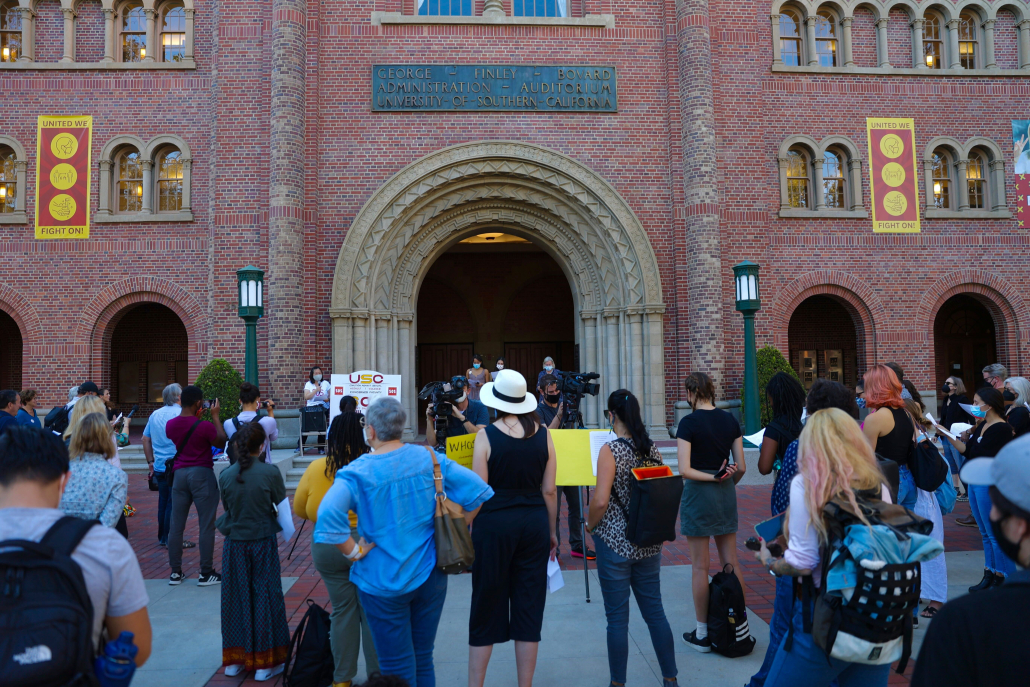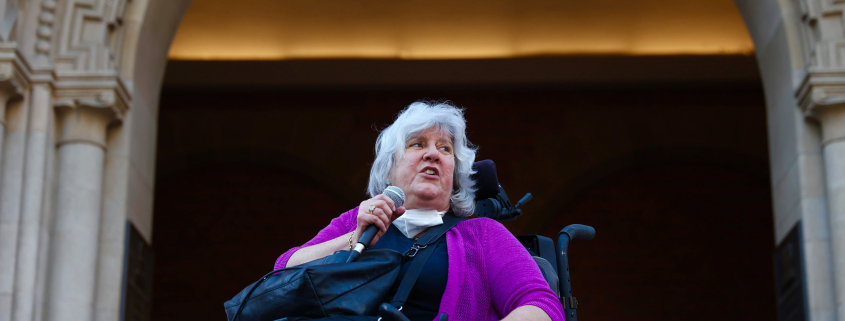Faculty, students hold protest

Faculty and students, chanting “stop the silence, no more violence” gathered on the Bovard Auditorium steps Thursday to voice their concerns about USC administration’s response to the Sigma Nu sexual assault and drugging reports.
The demonstration was organized by the Undergraduate Student Government, the Student Assembly for Gender Empowerment, faculty liaison Carol Wise and recognized student organizations, including USC Flow, Women in Science and Engineering and professional international relations fraternity Delta Phi Epsilon.
During her opening remarks, Carol Wise, a professor of political science and international relations, said the event aimed to give survivors a chance to openly talk about sexual assault and possible solutions.
In an interview with the Daily Trojan, after the event, Wise also said the current University bureaucracy holds many dysfunctional aspects. For Wise, the lack of rape kits on campus indicated this dysfunction.
“[USC administration] could have had the town hall, they could have immediately agreed to the rape kits,” Wise said. “They could have made a couple of concessions right off, they could give us a straight answer as to why it took three weeks to let us know there was a sexual assault.”
Regarding Provost Charles Zukoski’s email that announced the establishment of the Working Group on Interfraternity Council Culture, Prevention, and Accountability, Wise said President Carol Folt was antagonistic to students’ wishes.
“Folt already knew about this protest, she saw the list of demands, she said ‘I didn’t like it,’” Wise said. “The buck stops with you, right? You don’t like these demands? Well, you know, we don’t like making them, but you’ve got to meet some of them.”
Surrounded by the protests’ organizers holding transcriptions of chants, attendees went up to a podium and spoke on the issue.
Hilary Schor, professor of English literature and law took to the podium after student appeals for survivor resources and said while the turnout of the event was encouraging, the fact that many felt the need to protest was not.
“I speak to you as someone who has been [at] USC for 36 years. I’ve been working on these issues since my first year as an untenured assistant professor,” Schor said. “Here we are, all these years later, saying things that everyone, including everyone inside this cold-hearted building, knows to be true.”
Schor said the risk of sexual harassment that students face interferes with the University’s function to “nurture” and create a meaningful experience for its student body.

“I cannot do my job if students are not protected,” Schor said. “I stand before you, or more accurately, sit before you, as someone who knows that this struggle is ongoing, that we’re not free until all of us are free.”
Schor then gestured to the Bovard entrance behind her.
“What would it take to make you give a damn? What would it take to make you tell us the truth?” Schor said. “What would it take to make you reminded of your own activities and lack of activities over the years?”
Rachel Holzer and Eva Heinrichs, two principal organizers of the protest and members of DPE and USC Flow, shared their experiences after Schor and implored faculty to “stand up with and for students against the administration.”
“Over the last three and a half years, so many of my friends, myself included, experienced sexual violence on this campus.” Holzer said. “It is really, really incredibly insulting and frustrating.”
Holzer, a senior majoring in international relations, said she’s frustrated with the timing of the University administration’s response in an interview with the Daily Trojan following the event.
“We’ve created a set of 13 extremely feasible demands that they can implement in the short term,” Holzer said. “I really do not want to see task forces that are going to take a year or two years to do research to see if it’s a big enough issue that it’s worth upsetting the Board of Trustees.”
Holzer also said she doesn’t agree with the working group’s focus on the Interfraternity Council because the issue of sexual assault is campuswide.
“Part of the reason that we wanted to have this at Bovard instead of at Frat Row is because we want to make it very clear that this doesn’t stop and start with Frat Row,” Holzer said. “This is everywhere.”
Heinrichs, a junior majoring in sociology, said in an interview with the Daily Trojan that the Department of Public Safety’s reports fail to tell the full story of sexual assaults on campus.
“It would be so easy to be more transparent, and they’ve done everything they can to stop being transparent about all of these issues just to protect their students and their image,” Heinrichs said. “Administration is not going to step up. They’re going to try to bury it like everything else.”
In an interview with the Daily Trojan after the event, DPE President Natalia Parraz, a senior majoring in international relations, said even after a meeting with Folt Wednesday, she was left unsatisfied with the University’s response. Folt posted on Twitter Thursday that the meeting left her “looking forward to working” with Flow and other student organizations toward a “zero-tolerance” campus.
Offering online curriculums on sexual assault are not enough, according to Parraz.
“What we need to be doing is really looking at frat culture and what language they’re using and what behaviors are acceptable,” Parraz said.
Parraz said she thinks the University task force needs an open dialogue with the fraternities about their contribution to rape culture as well as actively involving student voices.
“What I hope happens is that USC decides right now [that] we want a culture that does not tolerate sexual assault,” Parraz said. “There’s a difference between demanding that and then seeing the change that will actually create that.”
Lucy Chi, an alumna and a former patient of George Tyndall, said despite the University’s promises of transparency, USC’s responses have fallen short and failed to include student voices.
“There’s a culture of just turning the other way, ignoring all of the horrible things that happen on this campus. A task force is a decent start, but they really need to do a lot more. I think what they should really do is listen to the students and faculty,” Chi said. “Don’t go to your expensive lawyers and come up with the bare minimum.”

